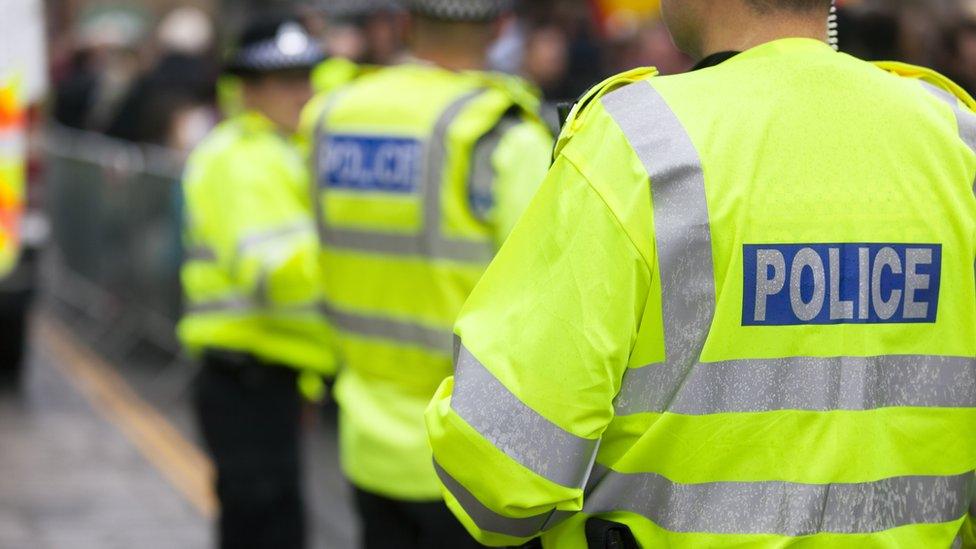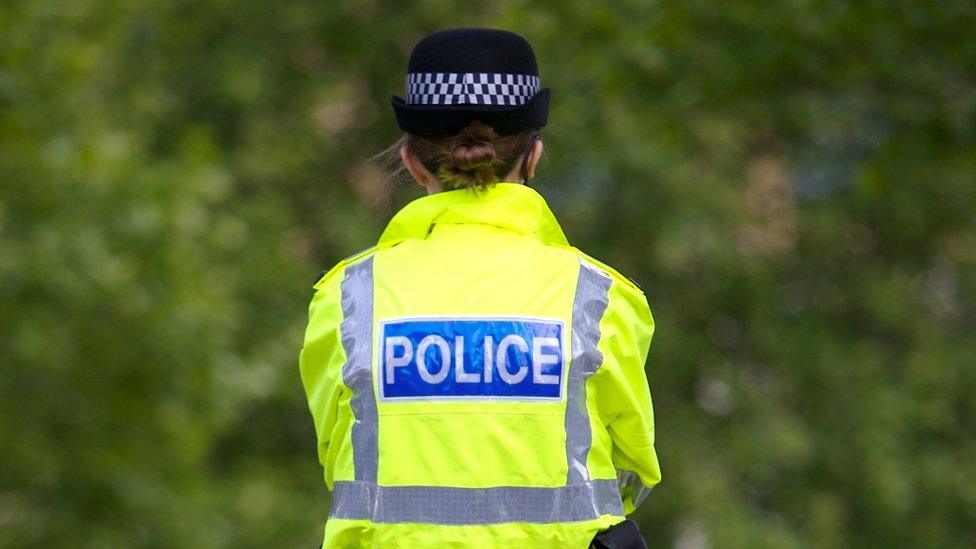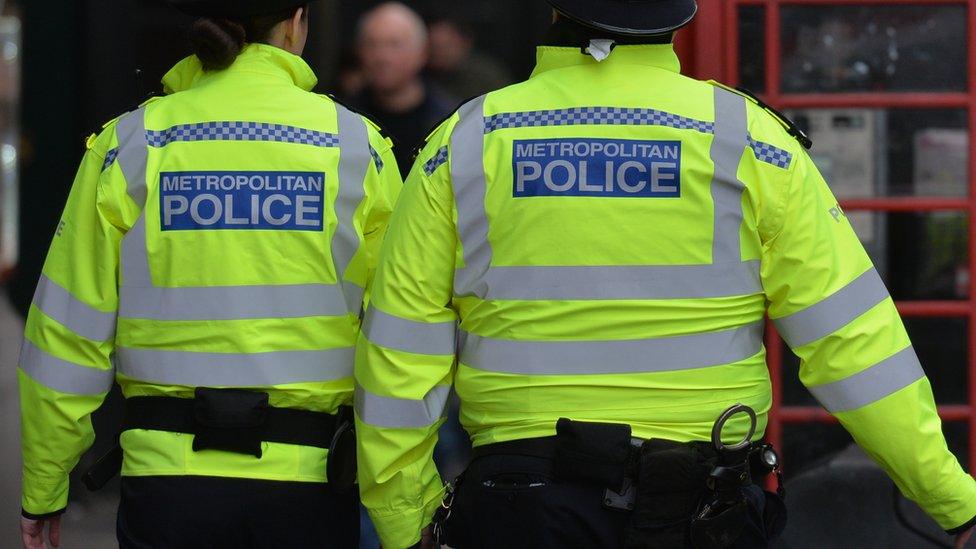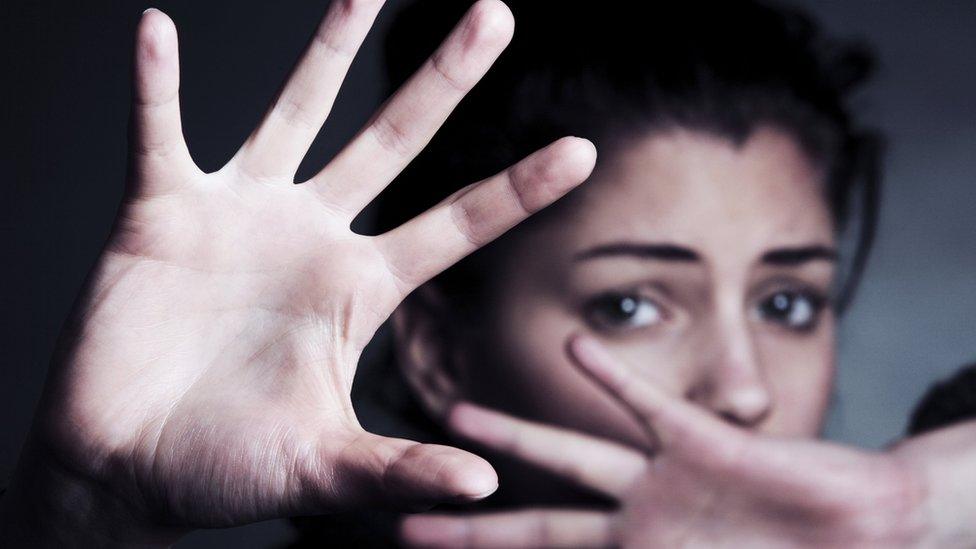Victims of police domestic abuse 'feel silenced'
- Published

UK police forces have received more than 800 allegations of domestic abuse against officers and staff over the last five years, BBC research has revealed.
Just 43 cases - about 5% of the total - were prosecuted.
Victims of domestic abuse have told the BBC they do not believe their complaints were properly investigated.
The National Police Chiefs Council said there was "no place in policing for people who abuse others".
In April, the BBC revealed the Metropolitan Police was investigating allegations that a serving officer raped two of his female colleagues.
The officer was not charged and has not been suspended but is on restricted duties pending a misconduct hearing more than three years after the allegations were reported.
The women were awarded compensation but one of them says "we were just cast aside and not cared for".
Since then more than 20 other police officers and staff from across the UK have contacted the BBC with their own stories of domestic abuse by colleagues.
They told Radio 4's File on 4 programme they were concerned how police deal with domestic violence allegations made against their own officers.

'I didn't feel safe'

Sarah, a Met officer who doesn't want to be identified, says she was abused by an older, more senior male colleague with whom she had a baby.
Describing one attack she endured she said he burst into their bedroom and began pulling her hair and shaking her head around.
"He then punched me in the arm, and then a couple of like open hand strikes on my back and threw me on the floor. And it was only when the baby was crying that he then stopped. I had bruising from the top of my bum all the way down to my knee on the side of my leg where he slammed the door on me."
Sarah ended the relationship and reported the incident months later to Kent Police. She showed officers a photo of the bruising, which the BBC has seen.
But an official police report concluded she had fallen against the door and Sarah was told it was too late to press charges.
The male officer was served with a non-molestation order to stop him contacting Sarah but he was allowed to visit their home to pick up his belongings accompanied by another officer.
Kent Police later apologised for the visit.
"I didn't feel safe despite working in a police building surrounded by police officers," she said. "If anything I felt more at risk because he was able to manipulate colleagues into checking on me or intimidating me. It felt just as scary as my home had been."
The male officer was later arrested and charged with breaching an injunction. The case then went to court but Sarah was told Kent Police had failed to send over all the evidence in time. Instead of a conviction, the court issued a restraining order.
In a statement the force said: "The public should be assured that reports of domestic abuse to Kent Police - no matter the circumstances - will be handled in a sensitive and compassionate way with investigations carried out to the highest possible standard."
Her employer, the Metropolitan police said tackling domestic abuse was a priority, including when its own staff are accused.

Victims 'pushed out and silenced'
The victims who contacted the BBC were all unhappy about the way the police investigated their complaints.
'Lucy' spent 10 years working on domestic abuse cases but resigned over the way she says her force treated victims.
"We know there are going to be bad officers. But actually, we don't deal with them in the right way," she said. "And we're letting down victims to be further victimised, pushed out and be silenced. I just couldn't stay. I'd rather be unemployed and poor than to continue serving that kind of organisation."
Lucy believes police officers are often unwilling to investigate each other.
"They have that almost unconscious bias towards believing their colleagues wouldn't do it," she said.
She said she also believes offending officers are effective at covering their tracks. "They're aware of the criminal justice system, so they will know things like what kind of evidence is required to meet a charge... how to potentially clean a crime scene, where to target injuries...They are untouchable."
'No place in policing for abusers'
Louisa Rolfe of The National Police Chiefs Council said: "Policing relies on the confidence of victims for us to do our job and to do our job effectively.
"There is no place in policing for people who abuse others. The vast majority of us are very intolerant of this and are horrified."
She added: "Prosecuting people for domestic abuse, whether they are police officers or in all walks of life, is something that we are really focussed on but does prove challenging."
David Tucker of the College of Policing, said: "Our guidance is clear that police officers and staff who are suspected of domestic abuse-related offences should not be treated differently to any other suspect."
He said the college recommended considering involving another force in investigations in appropriate cases of police domestic abuse.
The college is currently leading an investigation into how allegations of domestic abuse - where officers are suspects - are being treated, with a report due at the end of the year.
In the last five years, 829 allegations of domestic abuse have been made against police officers or staff, according to a freedom of information request by File on Four.
32 of the 46 UK police forces responded so the overall figure will be higher
Of those cases, 43 resulted in prosecution - 5% of the total - which is lower than the rate of domestic violence prosecutions against members of the public, which is 9%
Allegations made in 2020-21 may have not reached criminal court yet
Fifteen percent of the allegations resulted in disciplinary action
Victims Commissioner Dame Vera Baird said when an allegation is made against an officer it should be sent immediately to another force to investigate it independently.
"That is the only way to satisfy the outsider from this very collective, centralised, hierarchical, brotherly organisation... And frankly, in my view, it is the only way they'll get a good investigation," she said.
"It's imperative an independent investigation is carried out into the allegation just as you should for any allegation."
Related topics
- Published1 April 2021

- Published9 March 2020
